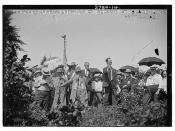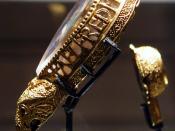Lingua Anglosaxonica
The Birth of English
In the fifth and sixth centuries three Germanic peoples-the jutes, the Angles and the Saxons- invaded England. They spoke dialects so nearly similar that they could understand each other. Those peoples of Britain formed an ethnic whole, and were named Saxons. However, they were sometimes called Angles At the end of the sixth century, Pope Gregory 1 uses only the name Angli.
The Roman missionaries used Gregory's term, Angli. It was probably from the official language of the church that the Jutes and Saxons learned to regard themselves part of the " Angle Kindred" ( Anglolcynn, in Latin Anglorum).
The political dominant power of the Angle kingdoms helped to ensure the adoption of the general name, Angles. In the early years of the eighth century, Bede uses Angli or gens Anglorum for the whole people in Britain. He calls their language sermo Anglicus.
Lingua Saxonica means the language of the East or West Saxons. A century and a half later, the west Saxon King Alfred uses " English" as the name of his language- the language of the Angles. Also, the history of southern English witnesses the spread of Anglian forms of words and the disappearance of the Saxon. The processes of transforming the English of Alfred into the English of Chaucer began in the Anglian regions of the north and then spread in the south. In brief, the language during five centuries in Britain became more and more "English" and less and less "Saxon".
English and Saxon: An Historical Clarification
The history of the nomenclature of the various stages in English is discussed at this point. In the sixteenth century, attention was paid to the remains of vernacular literature written before the Norman Conquest. The language of...


